Frequently Asked Questions
Q: What does Numbers 31:38 mean when it mentions 'the Lord’s tribute'?
A: In Numbers 31:38, 'the Lord’s tribute' refers to the portion of spoils from the war against Midian that was dedicated to Hashem. According to Rashi, this was a mandatory gift given to the Kohanim (priests) as a token of gratitude for their service in the Mishkan (Tabernacle). The verse specifies that out of 36,000 cattle, 72 were set aside for this purpose.
Q: Why were exactly 72 cattle given as tribute in Numbers 31:38?
A: The number 72 represents one out of every 500 cattle (36,000 ÷ 500 = 72). This ratio was commanded by Hashem (Numbers 31:28-30) as the portion to be given to the Kohanim. The Talmud (Chullin 11a) explains that this teaches the importance of separating a portion of one's possessions for holy purposes.
Q: What lesson can we learn from Numbers 31:38 about giving to holy causes?
A: Numbers 31:38 teaches the principle of hakarat hatov (recognizing the good) by dedicating a portion of our material blessings to holy purposes. The Rambam (Hilchot Matnot Aniyim) explains that giving to those who serve in spiritual roles (like the Kohanim did) shows appreciation for their service and maintains the sanctity of the community.
Q: How does the concept of 'tribute' in Numbers 31:38 apply today?
A: While we no longer bring animal tributes, the principle of separating portions for holy purposes continues through tzedakah (charity) and supporting Torah institutions. The Shulchan Aruch (Yoreh De'ah 248) rules that one should give at least 10% of earnings to charity, following the model of dedicating portions to sacred causes.
Q: Why does the Torah specify the exact numbers of cattle in Numbers 31:38?
A: The Torah specifies exact numbers to emphasize the precision required in fulfilling mitzvot. Rashi notes that the detailed accounting shows the Israelites' honesty in properly separating the required portions. The Midrash (Bamidbar Rabbah 22:8) teaches that being exact with holy matters demonstrates our reverence for Hashem's commandments.


Context in the Torah
This verse appears in Bamidbar (Numbers) 31:38, describing the spoils of war from the battle against Midian. The verse details the number of cattle taken and the portion designated as a tribute to Hashem.
Rashi's Explanation
Rashi (Rabbi Shlomo Yitzchaki) explains that the "Lord’s tribute" refers to the terumah (sacred portion) given to the kohanim (priests). The calculation follows the Torah’s requirement (Numbers 31:28-30) that one out of every 500 animals from the spoils of war be given to the kohanim as a tribute to Hashem. Here, 36,000 cattle divided by 500 yields exactly 72, aligning with the verse.
Rambam's Perspective
Rambam (Maimonides) in Hilchot Me'ilah (Laws of Sacrilege) 6:1 discusses the sanctity of such tributes. He emphasizes that once designated for Hashem, these animals attain a holy status and must be treated with the same reverence as other sanctified offerings.
Midrashic Insights
Halachic Implications
The Shulchan Aruch (Yoreh De'ah 61:1) cites this verse as a precedent for the obligation to separate terumot and ma'aserot (tithes) from produce, drawing a parallel between the spoils of war and agricultural gifts to the kohanim.